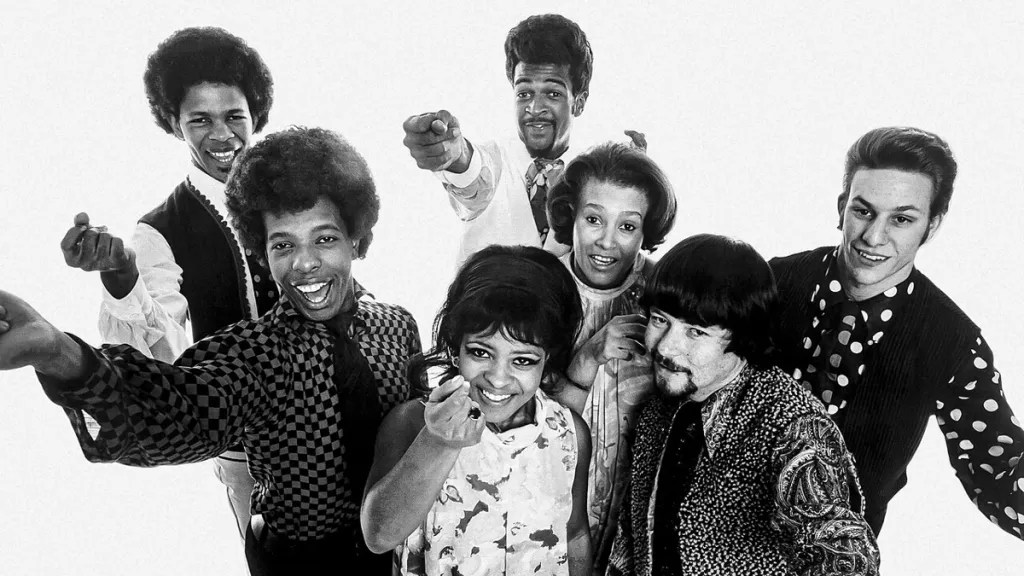
Photo Credit: Sly Stone (second from left) with Sly and the Family Stone for Epic Records (1968)
Revolutionary funk musician Sly Stone, whose Sly and the Family Stone redefined popular music in the late 1960s and early ‘70s, has passed away at age 82.
Born Sylvester Stewart, Sly Stone had been in poor health over the last few years. His publicist, Carleen Donovan, confirmed his death to the press. Stone died on Monday in Los Angeles, surrounded by family, after battling with chronic obstructive pulmonary disease (COPD) “and other ailments.”
Sly and the Family Stone was the first major group to feature a lineup of both Black and white men and women. Founded between 1966 and 1967, the group embodied the era—a time when “anything seemed possible.” Their music combined rapid-fire horns and guitar, as well as groovy rhythms, combining jazz, doo-wop, psychedelic rock, soul, and funk.
The band peaked in popularity from about 1968 to 1971, but despite their brief time at the top, Sly and the Family Stone captured the essence of the Woodstock era like no other. With hits like “I Wanna Take You Higher,” “Stand!,” and “Family Affair,” the group’s music spoke to a generation.
Sly and the Family Stone started as a sextet with Sly on keyboards, Larry Graham on bass, Freddie Stone on guitar, Rose Stone on vocals, Cynthia Robinson and Jerry Martini on horns, and Greg Errico on drums. Their debut album, A Whole New Thing, featured the breakthrough single, “Dance to the Music,” which hit the Top 10 in April 1968—the week Rev. Martin Luther King was murdered.
In 1969 at Woodstock, Sly led the group through a new era. Their songs, like “I Wanna Take You Higher” and “Everyday People,” were anthems of hope, community, and non-conformity. Five of their tracks were Top 10 singles, while three of them reached No. 1.
Other performers of the time tried to look and sound like Sly and the Family Stone, namely The Jackson Five’s breakthrough hit, “I Want You Back,” The Temptations’ “I Can’t Get Next to You,” and Miles Davis’ “Bitches Brew.” These and other songs from the late 1960s tried to capture Sly’s lightning in a bottle and recreate both his vocal style and the group’s instrumental arrangements.
But by the early 1970s, Sly was beginning to feel the weight of his rapid ascent to fame. His record company was champing at the bit for more hits, while the Black Panthers pressured him to drop the white members from his group. These stressors, plus his move from the Bay Area to Los Angeles, saw him become increasingly hooked on cocaine, which led to progressively erratic behavior. He became notorious for being late to his concerts or not showing up at all. His promised album, The Incredible and Unpredictable Sly and the Family Stone, never became a reality.
His music in the next decade echoed the separatism and paranoia that followed the end of the ‘60s. There’s a Riot Going On, released in 1971, set the tone for many Black artists to follow. These include Stevie Wonder’s single, “Superstition,” and Marvin Gaye’s album, What’s Going On.
Sly and the Family Stone had broken up by the end of the 1970s, and Sly was releasing solo records filled with unrealized promises. Most of the news he made from this point on involved his financial troubles, mishaps on stage, and drug busts.
The group was inducted into the Rock & Roll Hall of Fame in 1993 and honored in 2006 at the Grammy Awards. However, Sly released only one album after the early 1980s, I’m Back! Family & Friends, but much of the project was simply updated recordings of his older hits. According to Sly, he had hundreds of unreleased songs, and he did occasional collaborations.
Sly Stone had three children, including a daughter with Cynthia Robinson. He was also married once, a brief and very public wedding on stage at Madison Square Garden to actress Kathy Silva in 1974.





Recommended Comments
Join the conversation
You can post now and register later. If you have an account, sign in now to post with your account.